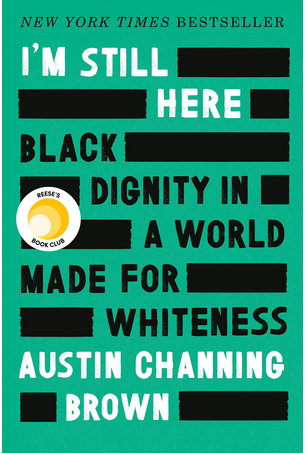Simply Book Shelf :: I'm Still Here : Black Dignity in a World Made for Whiteness :: Austin Channing Brown
I come to this blinking cursor with trembling hands because I don’t quite have the words to express how much the book I’m Still Here: Black Dignity in a World Made for Whiteness by Austin Channing Brown impacted me. However, I can’t not write about it. I can’t sit here and not encourage people to get their hands on it. As a person who thought she was growing, I continue to see how much more I need to grow. I feel we need to start with her words. Here are some of the MANY quotes that I loved from this book:
“I feel anger.
Even more frustrating, there are so few acceptable occasions for my rage to be expressed. Because I a am a Black person, my anger is considered dangerous, explosive, and unwarranted. Because I am a woman, my anger supposedly reveals an emotional problem or gets dismissed as a temporary state that will go away once I choose to be rational. Because I am a Christian, my anger is dismissed as a character flaw, showing just how far I have turned from Jesus. Real Christians are nice, kind, forgiving – and anger is none of those things.
Though I knew these interpretations to be ludicrous, dealing with these reactions to any hint of my anger was enough to prevent me from speaking it. The boldness I possessed in school melted away in the face of supervisors, performance reviews, benefits packages, and the backlash that came from expecting more out of my Church.”
“When an organization confuses diversity or inclusion with reconciliation, it often shows up in an obsession with numbers. How many Black people are in the photo? Has the 20 percent quota been met, so that we can call ourselves multicultural? Does our publication have enough stories written by people of color? Are there enough people of color on the TV show? But without people of color in key positions, influencing topics of conversation, content, direction, and vision, whatever diversity is included is still essentially white—it just adds people of color like sprinkles on top. The cake is still vanilla.
When this happens, people of color in the organization get saddled with the task of constantly fixing the harms done by halfhearted diversity efforts. We find ourselves challenging hiring decisions that don’t reflect the company’s stated commitment to diversity, pushing allies to speak up in rooms we hire marginalized voices aren’t represented, responding to events or sermons that don’t go far enough (or worse sermons that perpetuated harmful ideas). But must we always be the prophetic voice, the dissenter, the corrector, the fixer? Organizations would be wise to tap Black women in helping to craft the direction of the organization, the vision of the publication, the purpose of the ministry. When our voices are truly desired, numbers will cease to be the sole mark of achievement. ”
“White institutions are constantly communicating how much Blackness they want. It begins with numbers… but numbers are only the beginning. Whiteness constantly polices the expression of Blackness allowed within its walls, attempting to accrue no more than what’s necessary to affirm itself. It wants us to sing the celebratory ‘We Shall Overcome’ during MLK Day but doesn’t want to hear the indicating lyrics of ‘Strange Fruit.’ It wants to see a Black person seated at the table, but doesn’t want to hear a dissenting viewpoint. It wants to pat itself on the back for helping poor Black folks through missions or urban projects but has no interest in learning from Black people’s wisdom, talents, and spiritual depth. Whiteness wants enough Blackness to affirm the goodness of whiteness, the progressiveness of whiteness, the openheartedness of whiteness. Whiteness likes a trickle of Blackness, but only that which can be controlled.”
“We have allowed reconciliation to become synonymous with contentedly hanging out together. Reconciliation is not a magic word that we can trot out whenever we need healing or inspiration. Deep down, I think we know this is true, because our efforts to partake of an easy reconciliation have proved fruitless in the world. Too often, our discussions of race are emotional, but not strategic, our outreach work remains paternalistic, and our ethnic celebrations fetishize people of color. Many champions of racial justice in the Church have stopped using the term altogether, because it has been so watered down from its original potency.
In their book Radical Reconciliation, Curtiss DeYoung and Allan Boesak unpack why this happens. They write, ‘reconciliation is revolutionary, that is, oriented to structural change.’ Which means, reconciliation can never be apolitical. Reconciliation chooses sides, and the side is always justice”
This is just a small sampling of the incredible insight this book holds. Austin sharing her experiences of behavior necessary to function in society is heartbreaking and is told with potent, almost poetic, and visceral power. From not touching her pockets in stores so no one assumes theft, to the assimilation of understanding she has had to take on in order function in an assumed narrative of whitness in classrooms, workplaces, and ministries, or even having her call from God questioned… it left me speechless and humbled, and honestly incredibly angry on her behalf.
And then, I turn and look at my heart. Especially in the places that felt squeezed with discomfort.
I have done, or have witnessed and not stood up for, versions of these things happening to my friends of color.
I hate that I didn’t see it, or that I didn’t say something.
I know they don’t want my shame, they want me to see it, and do something with it.
“Doing nothing is no longer an option for me.”
You can find a copy of this incredible book anywhere books are sold (and also the first link in the blog!), or check out your local library. If they don’t have it, do your community a favor and request it.
xo,
Em


